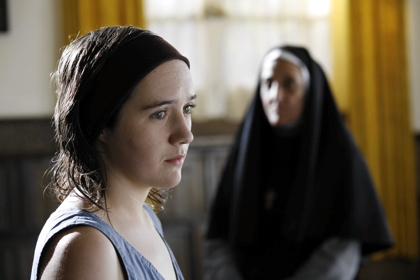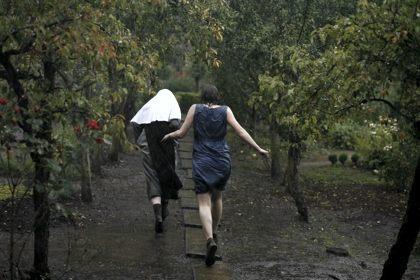Primary navigation


Militantly uncompromising, Bruno Dumont’s portrait of a nun turning to Islam sees the master of enigmatic mysticism himself swap condescension for compassion, says Jonathan Romney
French director Bruno Dumont has a reputation as a provocateur, but it’s sometimes far from easy to pin down the exact nature of his provocation – which is surely provocation in itself. In his earlier films – notably the US-shot misstep Twentynine Palms (2003) – an emphasis on sex and violence made Dumont easier to stereotype as the missing link between Bresson and Gaspar Noé. But in Hadewijch and last year’s Hors Satan, Dumont has found a new register of enigmatic subtlety that – together with a reaffirmed attention to starkly distinctive landscape photography – has resulted in two films that more than match up to his remarkable debut La Vie de Jésus (1997).
To sum up Hadewijch briefly would not only require a spoiler alert (capsule synopsis: novice nun turns Islamic fundamentalist) but would also suggest the premise of black farce à la Chris Morris. This being a Dumont film, the premise and its execution are to be taken very seriously, though not perhaps at face value. It’s worth noting that Hadewijch is riddled with gaps and ambiguities, not the least being that while we see former novitiate Céline and her companion Nassir travelling in tense silence on the métro immediately before an explosion at the Arc de Triomphe, we never see either of them plant a bomb. We’re left to decide whether Céline really has turned terrorist, or whether the blast is perhaps to be read as a visual metaphor for her nature as an unexploded faith bomb on a short fuse.
The central ambiguity underlying the film only becomes apparent from Dumont’s statements in interview: the idea that, while the director considers himself in no way religious, he is deeply committed to the idea of mysticism. For most of us earthly filmgoers this will be an inscrutable paradox, especially in an overtly theological drama about a profoundly, even morbidly religious protagonist, whose self-denying habits – says her Mother Superior – suggest an impious yen for martyrdom.
The film is named after a 13th-century female mystic. It’s only near the end that we hear a nun calling Céline ‘Hadewijch’; earlier, Céline tells Nassir that it is the name of the convent, which she calls “the place where I was born”. The film depicts Céline’s agonised journey towards the divine – a journey that leads to a suicide attempt, seemingly a final stab at martyrdom. This ending is preceded rather magnificently by Céline’s soliloquised prayer, a quasi-operatic lament scored by the eerily spiritual music of the early 20th-century composer André Caplet (Hadewijch is Dumont’s most musical film, also taking in live performances of Bach and, representing the thrill of the worldly, energetic accordion punk).

Dumont’s lead, young non-professional Julie Sokolowski, perfectly embodies ingénue otherworldliness. A luminous, candidly childlike presence, Sokolowski’s Céline has a moon-faced pallor that lends itself to evoking both rapture and tortured doubt, her awkward body language underlining her vulnerability. It’s largely because of Sokolowski that Hadewijch is the first film in which Dumont doesn’t seem to present his characters with an edge of implicit condescension: through her, he seems to have discovered compassion as a director, which means that we can read him as taking Céline’s extremity of faith with due seriousness and sympathy – not as folly but as spiritual dilemma. The film’s obvious theme would appear to be fanaticism, measuring Céline’s piety against Islamic fundamentalism. However, Nassir isn’t depicted as a fanatic in any clichéd sense, but as a severe but approachable figure, whose religious and political beliefs drive him towards a militant position. Whether or not the elliptical ending suggests that he is a terrorist is one of the film’s Rorschach-test elements.
The one theme that we can concretely grasp throughout is that of exile. Leaving the convent, Céline is haunted by the absence of Christ in her life. Her parents’ home is her true place of exile: an imposingly opulent apartment (her father is a government minister) on Paris’s patrician Ile Saint-Louis, in other words, ‘earthly splendour’ embodied. It is Nassir – the one person who can speak to her on the abstract theological level that appears to be her natural domain – who offers Céline a new spiritual haven, however dangerous the outcome of their allegiance.
Running in parallel with Céline’s story is that of a young workman (‘David’ in the credits) who, just as Céline leaves the convent, is taken off to prison, apparently for skipping parole. Glimpsed throughout, he returns from his own exile behind bars in time to rescue Céline in what appears to be a redemptive clinch – an embrace at once compassionate and earthily physical.
Here and in the considerably less naturalistic Hors Satan, Dumont has made two films that, while they provide ample food for discussion, nevertheless remain tantalisingly slippery; it would take a much longer analysis by a critic who was also a theologian to get to grips fully with Hadewijch. Dumont has reaffirmed his status as one of today’s most individual and genuinely uncompromising auteurs. And hats off to him for making such a militantly uncommercial film: not only a theme that will leave most viewers cold, but a title that few will be able either to spell or to pronounce.
We Have a Pope reviewed by Catherine Wheatley (January 2012)
Memento mori: Jonathan Romney on Xavier Beauvois’ Of Gods and Men (January 2011)
Les enfants terribles: Gaspar Noé and Harmony Korine talk Trash Humpers and Enter the Void (September 2010)
Four Lions reviewed by Ben Walters (June 2010)
Alias grace: Olivier Assayas, Bruno Dumont, Paul Schrader, Eugène Green and Aki Kaurismäki on Robert Bresson (November 2007)
Flanders reviewed by Hannah McGill (July 2007)
Into Great Silence reviewed by Catherine Wheatley (February 2007)
Keeping the Faith reviewed by Philip Kemp (October 2000)
L’Humanite reviewed by Tony Rayns (October 2000)